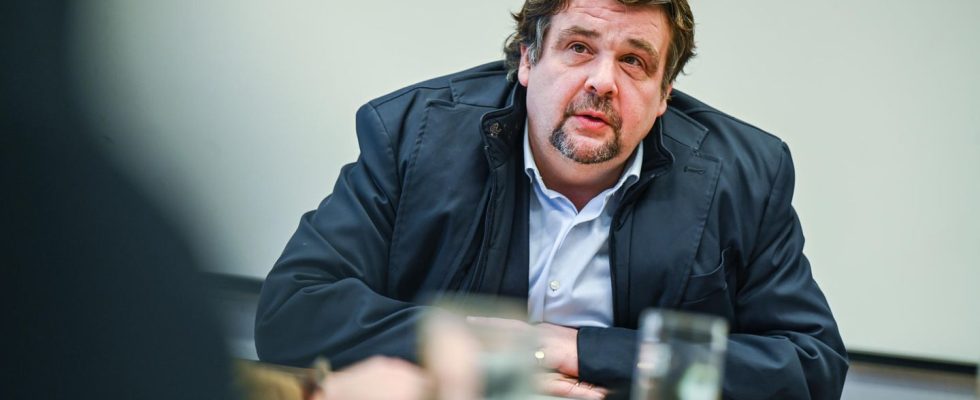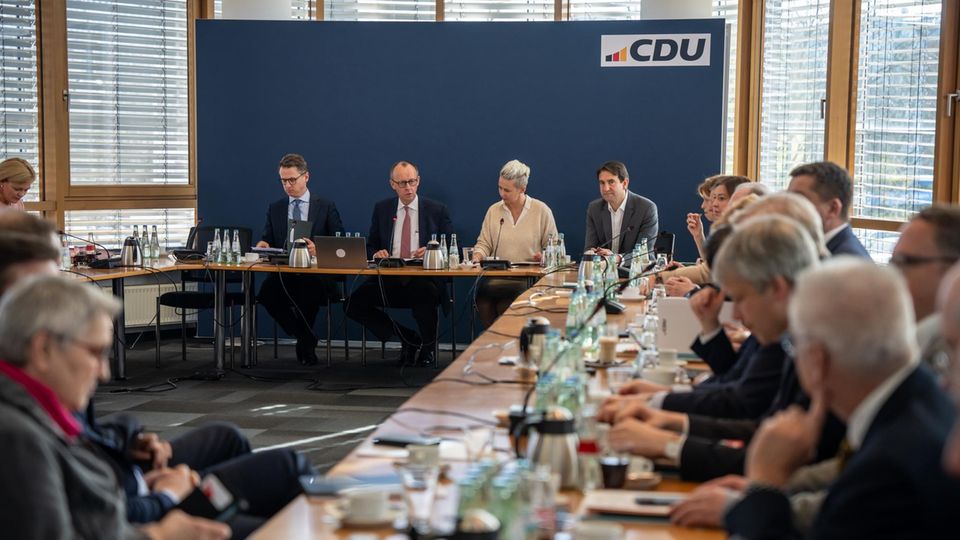interview
CDU politician on citizen’s benefit reform
“We have to differentiate ourselves linguistically from the average McKinsey consultant”
The CDU wants to replace the citizens’ money introduced by the traffic light in 2023 as a successor to Hartz IV with its own concept after the 2025 federal election
© Michael Kappeler / DPA
Dennis Radtke, deputy head of the CDU employee wing, defends his party’s citizens’ money plans – but warns: The debate should not focus on total objectors. Other aspects are neglected.
Have fun with that Constitutional Court. In 2019, Karlsruhe ruled on Hartz IV that benefits could only be reduced by up to 30 percent.
The Constitutional Court also leaves room for a reduction to zero. The long-standing President of the Federal Social Court confirmed this yesterday. But that’s not my point. I want to say openly: it really bothers me that the whole debate revolves around total objectors. Yes, a group that annoys everyone. But also a group that we can’t even quantify. Total refusers are just a small aspect of many when dealing with unemployment.
Your party has it focus itself focused on this topic.
This may be. When you highlight it like that, everyone turns their spotlight on it. I think that’s a shame. The CDU federal executive committee’s resolution paper contains important demands. For example, that we need a better care ratio so that a clerk has more time to support job seekers in their everyday lives. But a very important aspect is missing.
And that would be?
More than 20 percent of those receiving citizen’s benefit go to work. These are the so-called boosters. What do we do for them? After all, we don’t just want to get unemployed people out of the citizen’s benefit. Our aim must be that everyone can live from full-time work.
How should the CDU position itself on this issue?
I have great respect for anyone who works full-time, even though it’s not enough to last a lifetime. We must work to ensure that collective bargaining coverage increases significantly. In North Rhine-Westphalia alone we have 1.8 million people who earn less than 13.08 euros per hour. That’s a huge number. You can’t just unilaterally celebrate this huge low-wage sector as a great achievement. This leads to major problems with pensions and also with topping up. How do we deal with that? We have to give these people a perspective.
After losing the 2021 federal election, the internal analysis was that the CDU had paid too little attention to social policy. Has the party learned nothing from this?
There is still a lot of room for improvement. Again: I think it’s right that we are proposing concrete changes to citizens’ money – including a new name. But that doesn’t immediately fill all the blank spaces in our social profile. What relief do we offer for small and medium incomes so that work is really worthwhile for these people in the long term? When it comes to the wage gap requirement, we can’t just look down on those receiving citizens’ benefit from above. We need a 360-degree view.
What do you mean?
We have to ask ourselves: What can we do to make work in lower income groups more attractive again? This certainly doesn’t work just because people threaten to say: Look, we’re really going to get to the people’s money recipients! That can’t seriously be the message. This doesn’t relieve anyone’s burden of even a cent. We as the CDU still have huge potential among the hard-working population. The SPD has mutated from a workers’ party to a citizens’ money party. The comrades have nothing to offer for those who can barely make ends meet because of the skyrocketing prices. The CDU must be the advocate for these people.
Obviously neither does the Union.
We must do everything we can to fill this void. We still have a way to go. And that starts with the question of what to put at the center of the debate. The headline in the “Bild” newspaper about our plan was “No more support for the lazy unemployed” – seriously? We must make it clearer: We are a centrist people’s party with strong Christian-social roots. And we have to use language that differs from the average McKinsey consultant. It’s not just what you say, but how you say it.
It almost sounds as if the CDU is suffering a relapse to 2003, when the party decided on a strictly neoliberal program at its Leipzig party conference.
No. At that time, the foundations of the welfare state were being shaken. I don’t see that today. There is no revival of 2003.
So Nobert Blüm could – apart from a few suggestions for improvement – live quite well with the new course of the Merz-Linnemann CDU?
Absolutely. Blüm was not an apologist for the hammock welfare state. For him it was about relief for everyone who works. And the question: What do we have to do to organize participation for the unemployed? This is part of our Christian democratic view of humanity. We do not believe that people are best off when they are dependent on the state. Everyone should be able to take care of themselves. Some people need support on this journey. We must not forget that unemployment affects people. Around 20 percent suffer from mental illnesses. This is not just an obstacle to mediation, it is primarily a drama for each individual.



